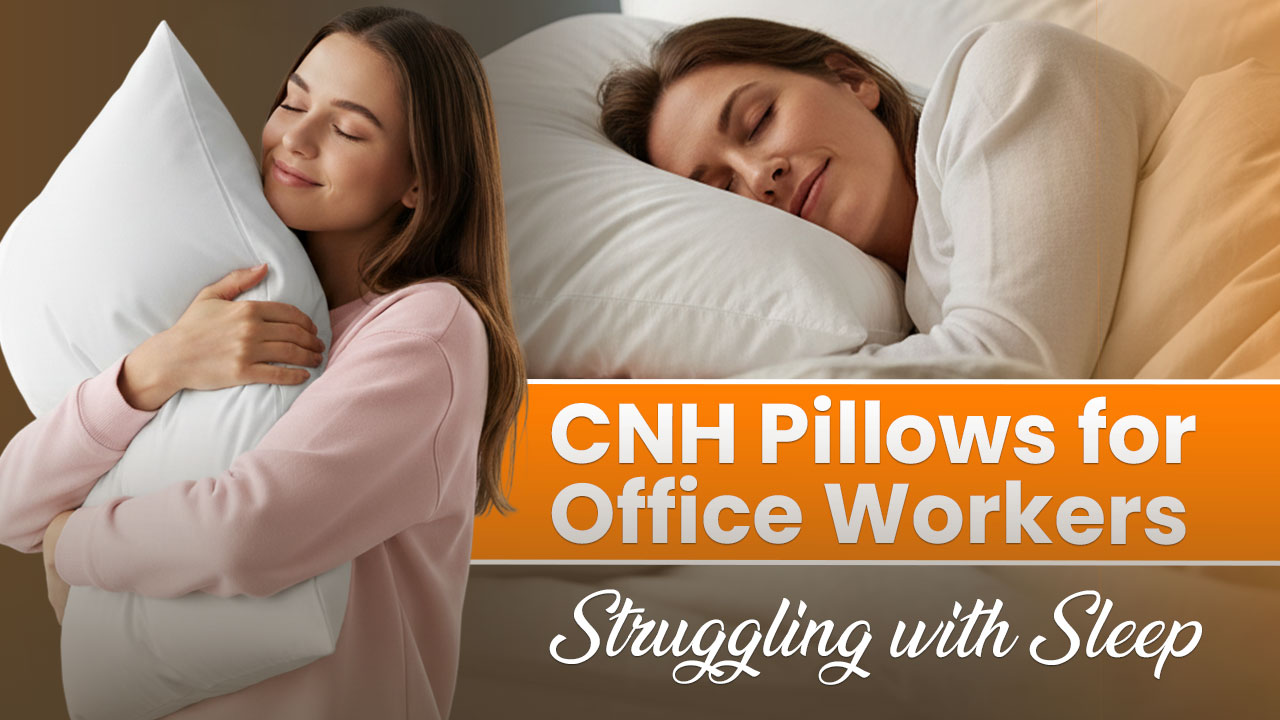Creating a Sleep-Friendly Space for Older Adults
Nov 18th 2024
Getting enough quality sleep is essential at any age, but for older adults, it plays an even more significant role in maintaining physical and mental health. As we age, natural changes in our bodies and sleep patterns can make achieving a restful night more difficult. This is why creating a sleep-conducive environment for older adults is critical for ensuring they get the sleep they need.
A healthy sleep environment isn’t just about choosing the right bed—it’s about creating a comprehensive setup that allows for comfort, relaxation, and better sleep hygiene. In this comprehensive guide, we will explore various factors that contribute to a healthy sleep environment and provide practical tips to optimize your bedroom for restful sleep.
Quality sleep is vital for overall health, especially for older adults. It aids in physical recovery, cognitive function, and emotional well-being, making it essential to prioritize a conducive sleep environment.
Key Notes
- Poor sleep can exacerbate chronic health issues common in older adults, such as heart disease, diabetes, and cognitive decline.
- Factors like mattress quality, pillow support, lighting, and noise levels can significantly impact sleep quality. .
- Each person has unique sleep preferences and requirements. Customizing the sleep environment—such as choosing the right bedding mattress and pillow—can enhance comfort and support for older adults.
- Small adjustments in the bedroom, such as temperature control and reducing clutter, can create a more inviting and restful atmosphere for sleep.
How Much Sleep Do Older Adults Need for Optimal Health?
The amount of sleep older adults need can vary based on individual health, lifestyle, and personal factors, but general guidelines suggest that older adults typically require 7 to 9 hours of sleep per night. Here’s a more detailed breakdown:
Sleep Needs by Age Group
- Ages 65 and older: Generally recommended to get 7 to 8 hours of sleep.
- Ages 50 to 64: Aim for 7 to 9 hours of sleep.
- Ages 18 to 49: Require about 7 to 9 hours, with some needing up to 10 hours.
Invest in a supportive pillow to enhance your comfort as you enjoy these essential hours of sleep!
Factors Affecting Sleep in Older Adults
- Changes in Sleep Patterns: As people age, they may experience changes in sleep architecture, including more time spent in lighter stages of sleep and less time in deep sleep.
- Health Conditions: Chronic conditions, medications, and mental health issues can impact the quality and duration of sleep.
- Lifestyle Factors: Activity levels, diet, and stress can also influence sleep needs and patterns.
Ready to find the perfect pillow? Explore our collection of comfortable sleep easy pillows to ensure a restful night's sleep!
We have designed the best Elderly Pillow for you!
Explore Sleep Easy PillowsThe Importance of a Healthy Sleep Environment
For seniors, optimizing the bedroom environment for good sleep can lead to significant improvements in health, mood, and even longevity.
A healthy sleep environment focuses on the following factors:
- Temperature control
- Comfortable bedding, with a supportive pillow for the elderly
- Noise reduction
- Proper lighting
- A consistent sleep routine
Creating a restful environment is one of the most effective non-medical treatments for insomnia, especially for older adults. Let’s explore each element in detail.
Choose the Best Sleeping Pillow for Elderly Comfort
Pillows are more than just fluff—they're integral to a healthy sleep environment. That’s why choosing the best sleeping pillow for elderly individuals is critical. These pillows need to provide both support and comfort, ensuring proper spinal alignment throughout the night.
An ergonomic pillow designed for seniors typically focuses on:
- Neck and Head Support: Look for pillows that cradle the neck without pushing the head too high.
- Pressure Relief: Seniors are more prone to conditions like arthritis and joint pain, so a pillow that reduces pressure on key areas is essential.
- Adjustable Loft: Some pillows allow you to add or remove filling, making it easy to adjust the height for optimal comfort. The adjustable pillow provides customizable loft and support to save yourself from ear pain.
CNH SleepEasy pillows are specially contoured to reduce strain on pressure points, which is critical for anyone dealing with stiffness, pain, or limited mobility.
Create a Sleep-Conducive Environment with the Right Mattress
Much like pillows, the mattress plays a huge role in sleep quality. Older adults often need a mattress that can relieve pressure points and provide proper body support.
Experts recommend the following when choosing a mattress for older adults:
- Medium-Firm Mattresses: These strike the perfect balance between comfort and support, reducing pressure on joints while maintaining spinal alignment.
- Memory Foam or Hybrid Mattresses: These types of mattresses are great for providing contouring support and minimizing motion transfer, which is helpful for couples sharing a bed.
- Adjustable Bed Frames: For some seniors, adjustable bed frames allow them to elevate their heads or feet, which can alleviate conditions like acid reflux or improve circulation.
By creating a sleep-conducive environment with the right mattress, you ensure that seniors can enjoy deeper, relaxed, and more restorative sleep.
Create a Healthy Sleep Environment with Optimal Room Temperature
Temperature plays a critical role in promoting a healthy sleep environment, especially for older adults who may have trouble regulating body temperature due to natural aging processes. Maintaining the right bedroom temperature can prevent disruptions in sleep caused by feeling too hot or too cold.
The Ideal Temperature for Sleep:
- The optimal room temperature for sleep is between 60°F and 67°F (15.5°C to 19.4°C).
- For seniors, who may be more sensitive to temperature changes, keeping the room cool but comfortable is essential.
Control Light and Sound for a Conducive Sleep Environment
Lighting and noise are two of the most common external factors that affect sleep. Controlling these factors is essential for creating a conducive sleep environment for older adults.
Light Control
- Blackout curtains: These can block out light from outside, such as streetlights or early morning sunlight.
- Dim the lights: Use soft, warm lighting in the bedroom in the evening, and avoid bright, overhead lights. Dimming the lights about an hour before bedtime helps signal to the body that it's time to wind down.
Noise Reduction
- Use a white noise machine to create a calming, consistent sound that drowns out other noises.
- Earplugs are another simple solution for those sensitive to sound.
- Ensure the bedroom is insulated against outside noise as much as possible.
Maintain a Consistent Sleep Routine
Routines can make a huge difference in sleep quality for older adults. Going to bed and waking up at the same time each day, even on weekends, is essential.
Wind Down Before Bedtime
- Reading a book: Choose a light, non-stimulating book to help calm the mind.
- Listening to soothing music: Soft instrumental music or nature sounds can be relaxing.
- Practicing gentle stretches: This can help alleviate muscle tension and joint stiffness, which are common in older adults.
Optimize the Bedroom Environment for Good Sleep
Making small adjustments can go a long way toward improving comfort and relaxation.
- Keep the Room Dark: Darkness is essential for promoting melatonin production, which aids in falling and staying asleep. Use blackout curtains or an eye mask to block out any unwanted light sources.
- Clutter-Free Space: A cluttered, disorganized bedroom can contribute to feelings of stress and restlessness.
- Comfortable Sleepwear: Older adults should opt for breathable, loose-fitting sleepwear made from natural fabrics like cotton to stay cool and comfortable throughout the night.
Dr. Sarah Mitchell, a geriatric care expert, says,
“The right environment goes beyond just the bed. Everything from the color of the walls to the air quality can influence sleep. A calm, organized, and comfortable room is key to promoting rest.”
The Impact of Sleep on Health for Older Adults
Quality sleep is essential for everyone, but for older adults, it's particularly important. Research shows that poor sleep can contribute to a range of health issues, including:
- Weakened Immune System: A lack of sleep weakens the immune system, making seniors more susceptible to illness.
- Cognitive Decline: Poor sleep has been linked to a higher risk of developing conditions like Alzheimer's disease and dementia.
- Increased Risk of Heart Disease: Studies show that insufficient sleep can increase the risk of heart disease and stroke, particularly in older adults.
Improving sleep quality through a conducive sleep environment can have profound effects on overall health and well-being, reducing the risk of these conditions and promoting longevity. Ready to transform your sleep environment? Check out CNH Pillow for high-quality sleep products designed to enhance comfort and promote better sleep for older adults!
Conclusion
Creating a sleep-conducive environment for older adults doesn’t require a complete bedroom overhaul. Small changes, such as adjusting lighting, choosing the best sleeping pillow for elderly sleepers, and regulating bedroom temperature, can improve sleep quality. By focusing on these factors, you’re not only promoting better rest but also contributing to the long-term health and well-being of older adults. Sleep better, live better!
Frequently Asked Questions
How to improve sleep for seniors?
Make sure your bedroom is comfy—not too hot or cold—and keep it quiet. Use soft lighting in the evening as you get ready for bed. Try to exercise at the same time each day, but avoid it in the last three hours before sleep. Also, steer clear of big meals close to bedtime since they can keep you awake.
Why do seniors wake up in the middle of the night?
Older adults wake up more often because they spend less time in deep sleep. Other reasons include needing to go to the bathroom, feeling anxious, or experiencing discomfort from health issues.
Why do older people have trouble sleeping at night?
As we age, our bodies produce less melatonin, the hormone that helps us sleep. Changes in hormones like melatonin and cortisol can disrupt sleep patterns, making it harder to rest well at night.
How many hours of deep sleep should a 70-year-old get?
For healthy adults, about 13 to 23 percent of sleep should be deep sleep. So, if you sleep for eight hours, you should aim for about 60 to 110 minutes of deep sleep. Most adults also spend around 25 percent of their night in REM sleep, which is important for dreaming and overall rest.
Why is sleep important for older adults?
Sleep is vital for older adults because it supports brain health, lifts mood, and boosts overall well-being. Getting good rest can help prevent chronic health issues and improve daily life.
How can I choose the right mattress and pillows?
Look for a mattress that feels supportive and fits your sleeping style. For pillows, pick ones that keep your head and neck aligned; adjustable pillows can offer great flexibility for comfort.



